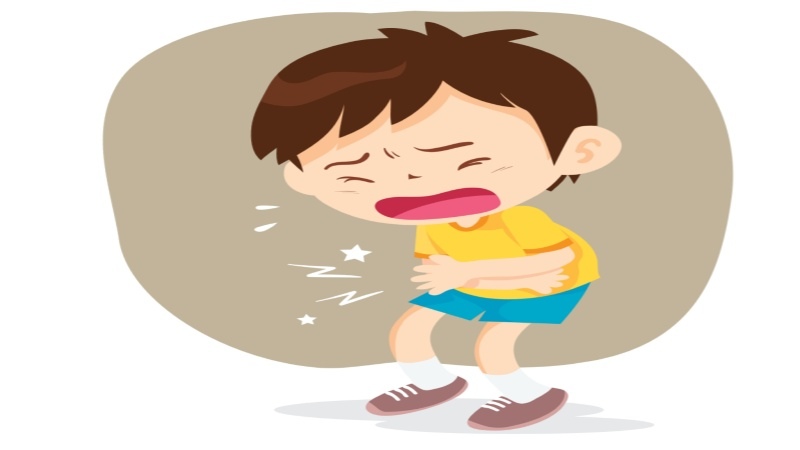Is The Tummy Ache Real Or Is Your Child Faking It?
“Mama, my tummy hurts”. Your 5 year old is holding on to her tummy and refusing to get up from the bed. You are worried about her missing the school, but it clearly looks like she is in lot of pain. You decide to let her stay home for the day. In few hours, she is up and running around in the house, with no sign of tummy ache. In couple of days, she repeats the same “tummy ache” act again. You push her to go to school, reminding her that the ache will go away in some time. Soon, this becomes a routine. And that is when it occurs to you that your child might be faking a tummy ache to get away from school. You accuse her of lying. You stop believing her pain complaints.

But Is She Really Faking It?
The answer is no. There may or may not be an underlying medical problem that is causing it, but chances are the recurrent tummy aches are real and your child is not faking it. So instead of disbelieving her, you need to find the root cause for the tummy ache.
How To Identify If There Really Is A Medical Problem?
The first step is to rule out all the commonly seen tummy problems. Here is a checklist you can use:
- Did she vomit? Or is she having loosies? Then, most likely she has caught a stomach bug (or stomach infection). You might want to check with her doctor to get a medicine to fight the infection. Make sure she remains hydrated
- When did she last poop? If she has not pooped for a day or more, then the tummy ache is probably caused by constipation. In fact, kids who poop daily also are sometimes constipated if they are not clearing their colon with every trip to toilet. This can lead to formation of gas, which will surface as tummy ache.
- Identify any eliminate any food that is causing gas from your child’s diet. Also, include lot of fiber-rich food and fluids to fight constipation
- Is the pain in chest and upper stomach? This is most commonly a case of Gastroesophageal Reflux. Or in more simple terms, acid reflux. Remember how small babies spit up all the time. In older kids it surface as heart bur.
- Talk to your child’s doctor for any medication. Keep junk food, spicy foods and acidic fruits off the menu for your child. Also watch out for any food that triggers heart burn and stop feeding it to the child
- Did she have bloody stools? She might be having stomach ulcers. Ulcer pains are most common when tummy is empty – so a complaint first thing in the morning seems like a reasonable thing to expect.
- You need to take the child to a doctor who will prescribe antibiotics to treat the ulcer, after diagnosis
- Is she having a fever? A fever is a sign of body fighting an infection. So if the child is having fever and tummy pain, it is best to check with the doctor.
Now one thing that is different in all the above examples is “recurrence”. While the list above is handy to rule out commonly occurring tummy problems, you might need to be more vigilant with the symptoms, if they are recurring in nature.

What Is The Cause Of Recurring Tummy Ache In My Child, Especially In The Morning?
As we said before, your child might not be faking it, as much as you seem to think she is. The pain might be real. In fact, recurring morning tummy ache is reasonably common as well – occurring in 15% of all children. And the good news is most of these aches do not result in any long term problems. So what causes them and what can you do about them?
- Stress: This is the most common reason for dull tummy aches that appear in the morning and disappear after sometime. If you feel that the pain is not intense and it is triggered by the idea of going to school (for instance, no pain during holidays and weekends), then you need to support your child and try to understand what is causing her anxiety or stress. Create an environment where she can openly discuss her problems, fears and confusions. Once you calm her stress, the tummy aches will disappear on their own
- Functional Abdominal Pain: This is characterized by intense or severe pain, especially around the belly button. It usually appear in the morning, but it can also appear in night. It might occur for few hours, few days or even few weeks. This means that your child has a very sensitive intestine and this is causing even a small tummy problem (like gas) to hurt a lot. Unfortunately, there is nothing much you can do to make her intestines less sensitive. But research shows that distraction works best to keep your child’s mind away from the pain. Further, if as parents you make a big deal out of this or keep the child away from school for days – the child might only relate to the pain better and continue to increasingly complain
- Irritable bowel syndrome: This is also very similar to functional abdominal pain in the sense that it is caused by over sensitive intestines too. However, this one will be accompanied by bloating, gas and either diarrhea or constipation. Distraction, more fiber in diet and more fluid intake can help check the pain to an extent
- Abdominal migraines: We are more familiar with migraine headaches. But the same neuro-vascular problems that causes headaches can cause tummy aches too. The pain will be intense and it will be around the belly button. Just like headaches, good sleep and diet can keep abdominal migraines at bay. It is also a good idea to consult the doctor
It requires patience – but by watching your child closely and communicating with her openly, you should be able to pinpoint her exact symptoms so that you can help the doctor figure out the real cause behind the tummy aches.


